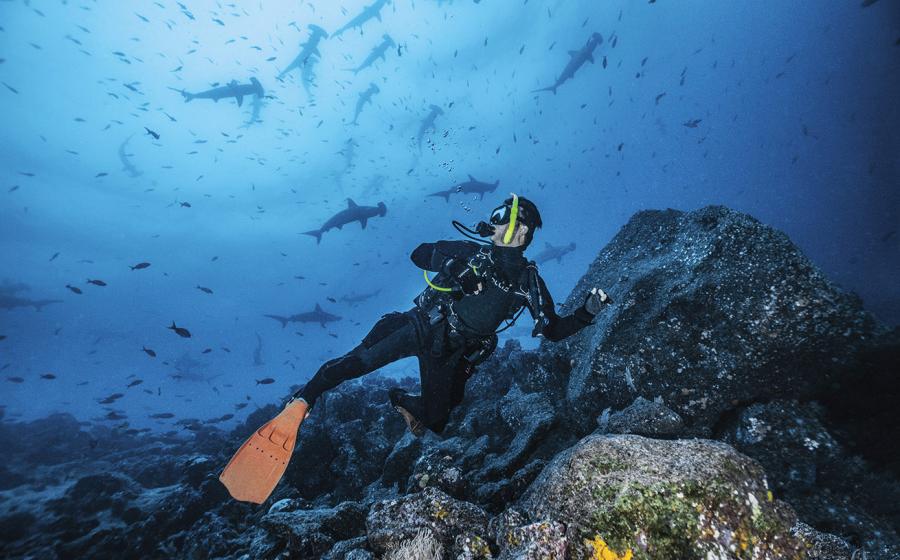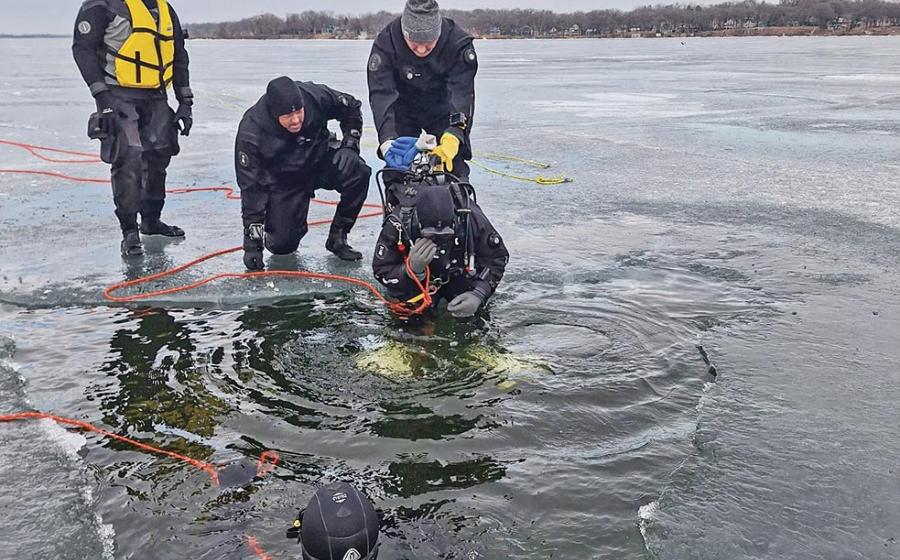The Tobacco Effect
September 2007
By Selene Yeager
Cigarettes have carried the Surgeon General's dire warnings for more than 30 years. If you're a classic pack-a-day smoker, you've likely read that "smoking causes lung cancer, heart disease, emphysema, and may complicate pregnancy" roughly 1,825 times during the past five years. You know it's not good for you. But what you might not know is how especially bad it is for your scuba diving.
DAN researchers recently reviewed 4,350 cases of decompression sickness that were reported over an eight-year period, comparing the severity of symptoms among nonsmokers, light smokers and heavy smokers. They found that heavy smokers were more likely to have severe symptoms compared to nonsmokers, and both heavy and light smokers were more likely to have severe and moderate symptoms than nonsmokers, who tended to have milder cases of DCS. In short, if you're a smoker and you get bent, you're more likely to have a serious neurological event than a mild case of joint pain or skin mottling.
The Heart of the Matter
Smoking also triggers a cascade of cardiovascular events that are dangerous by themselves, but even more potentially deadly when combined with the stresses of scuba, says Fernando Roth, M.D., a cardiologist and occasional diver practicing in Pasadena, Calif.
For one, cigarette smoking causes both vasoconstriction, temporary narrowing of the blood vessels, and atherosclerosis, permanent vessel stiffening and narrowing, which sends your blood pressure soaring. It also causes platelet activation (blood clotting), which thickens your blood, making it even harder for circulation to flow through your constricted vessels. Finally, cigarette smoke contains carbon monoxide, which binds to your red blood cells, hogging up space that should be occupied by the oxygen your body desperately needs and is already struggling to get through your bottlenecked arteries. Submerge this overburdened heart into cold, deep water and you've set the stage for a heart attack. "I'd offer my business card to any diver who smokes, because they will eventually need it ... if they survive," says Roth.
The Great Gas Exchange
Even if your heart survives the stress of your smoking habit, your lungs may not. If you could unzip your chest and peer inside, you would see two spongy elastic organs that expand and constrict as you breathe. Those are your lungs, and their primary job is to draw in oxygen-rich air and expel carbon dioxide waste from your cells. That essential exchange happens in the alveoli, grape-like air sacs that line your lungs.
"Smoking damages the alveoli, causing the small alveoli to pop out and become large and thin-walled, which reduces their ability to exchange gases," explains Paul Davenport, Ph.D., pulmonary researcher and professor at the University of Florida in Gainesville. "Once alveoli are gone, they're gone. You can't get them back. The lungs themselves eventually lose their elasticity and don't inflate and recoil as well." This lung weakness is called emphysema, and you can have early stages and not know it. Therein lies the danger.
With the normal lung structure destroyed, air can get trapped in the distended alveoli and increase your risk for pulmonary barotrauma and arterial gas embolism, says DAN physician Jim Caruso, M.D. "I've seen smokers with lungs so stiff and damaged, I'm amazed they are able to exchange gas at all," he says.
Which brings up the decompression dilemma. "The science of scuba diving is built around gas exchange, and smoking greatly interferes with this exchange," says Caruso. Most notably, cigarette smoke contains carbon monoxide, which as mentioned earlier, binds to your red blood cells so they're less effective at carrying oxygen to your body's tissues. The carbon monoxide levels of heavy smokers can be as high as 10 percent, meaning 10 percent of your oxygen is displaced by carbon monoxide, compared to just 2 percent among nonsmokers. Without healthy gas exchange, you're at increased risk for narcosis, decompression problems and a throbbing diver's headache.
Sneezes and Squeezes
You know that rattling smoker's hack? That's the product of all the mucus smokers produce. Cigarette smoke paralyzes the cilia (the little hairs that act like filters to clear the dirt, dust and mucus from your sinuses), so more gunk gets in your airways. Worse, smoking aggravates your airways, so your body produces more mucus than is normal. The only way to clear it out is to cough it up.
All this mucus not only makes equalization more difficult and increases your susceptibility to middle ear and sinus blocks and squeezes, but all that sticky stuff in your airway increases the likelihood that you'll develop a mucus plug--a blockage in one of your bronchial tubes. The gas trapped beyond the blockage further increases a smoker's risk of rupturing a lung or developing arterial gas embolism during ascent, even if you're breathing normally and continuously the whole time.
Breathe Easy
Quitting smoking can be excruciating. Most people try to kick the habit about a half dozen times before it finally sticks. The good news is that new smoking-cessation systems help wean you off nicotine without massive withdrawal.
Nicotine replacement therapy in the form of patches, gum, nasal spray, lollipops, lozenges or inhalers can deliver a steady stream of nicotine or a quick hit when your cravings get too intense. Studies show these products double your chances for successfully giving up cigarettes. For stubborn addiction, some doctors may also prescribe Zyban, an anti-smoking drug that helps quell nicotine withdrawal symptoms.
Though there's nothing but benefits for quitting smoking, you should be careful about planning dives while going through your cessation period. For one, your body actually produces more mucus during the first week or so after your last cigarette, as your body goes into overdrive to clean out the residual gunk. So you may be at an even greater risk for squeezes and mucous blocks.
If you choose to use a nicotine-replacement system, you're still at increased risk for a heart attack or other cardiovascular event because nicotine in any form causes vasoconstriction. You should assess your risk with your doctor. If you need Zyban, you shouldn't dive until you're off of it because the med can cause dizziness and it also increases your risk for a seizure or even loss of consciousness, which can be disastrous during a dive.
Finally, you want to go into your dives calm and collected, not in the throes of a nicotine fit or agitated withdrawal. If you go cold turkey, withdrawal symptoms are most intense for the first two to three weeks before they subside. If you use nicotine-replacement products, you'll likely be on them at least eight to 12 weeks before you start tapering down. So allow yourself plenty of time to quit the habit, clear your lungs and calm your mind before taking your next dive.
Don't be a Butthead
If you smoke, and can't wait until you're off the boat to light up, we'll spare you the medical lecture. But please be considerate. Follow these basic rules of etiquette:
Get down-wind. Space is at a premium on most dive boats. If you do smoke, you should know the drill by now: find a down-wind corner of the boat, in open air and away from others as much as possible. Just because you smoke doesn't mean the rest of us should have to.
Dispose of your butts properly. When you're done, extinguish and field-strip the butt so the remnants of paper and tobacco will scatter and decompose. Put the plastic filter in a trash can or take it home. According to the Ocean Conservancy, cigarette butts top the Dirty Dozen list of the most common forms of marine debris. During the 2006 International Coastal Cleanup, volunteers collected 1,901,519 of them. You can see the magnitude of the problem.
September 2007
By Selene Yeager
Cigarettes have carried the Surgeon General's dire warnings for more than 30 years. If you're a classic pack-a-day smoker, you've likely read that "smoking causes lung cancer, heart disease, emphysema, and may complicate pregnancy" roughly 1,825 times during the past five years. You know it's not good for you. But what you might not know is how especially bad it is for your scuba diving.
DAN researchers recently reviewed 4,350 cases of decompression sickness that were reported over an eight-year period, comparing the severity of symptoms among nonsmokers, light smokers and heavy smokers. They found that heavy smokers were more likely to have severe symptoms compared to nonsmokers, and both heavy and light smokers were more likely to have severe and moderate symptoms than nonsmokers, who tended to have milder cases of DCS. In short, if you're a smoker and you get bent, you're more likely to have a serious neurological event than a mild case of joint pain or skin mottling.
The Heart of the Matter
Smoking also triggers a cascade of cardiovascular events that are dangerous by themselves, but even more potentially deadly when combined with the stresses of scuba, says Fernando Roth, M.D., a cardiologist and occasional diver practicing in Pasadena, Calif.
For one, cigarette smoking causes both vasoconstriction, temporary narrowing of the blood vessels, and atherosclerosis, permanent vessel stiffening and narrowing, which sends your blood pressure soaring. It also causes platelet activation (blood clotting), which thickens your blood, making it even harder for circulation to flow through your constricted vessels. Finally, cigarette smoke contains carbon monoxide, which binds to your red blood cells, hogging up space that should be occupied by the oxygen your body desperately needs and is already struggling to get through your bottlenecked arteries. Submerge this overburdened heart into cold, deep water and you've set the stage for a heart attack. "I'd offer my business card to any diver who smokes, because they will eventually need it ... if they survive," says Roth.
The Great Gas Exchange
Even if your heart survives the stress of your smoking habit, your lungs may not. If you could unzip your chest and peer inside, you would see two spongy elastic organs that expand and constrict as you breathe. Those are your lungs, and their primary job is to draw in oxygen-rich air and expel carbon dioxide waste from your cells. That essential exchange happens in the alveoli, grape-like air sacs that line your lungs.
"Smoking damages the alveoli, causing the small alveoli to pop out and become large and thin-walled, which reduces their ability to exchange gases," explains Paul Davenport, Ph.D., pulmonary researcher and professor at the University of Florida in Gainesville. "Once alveoli are gone, they're gone. You can't get them back. The lungs themselves eventually lose their elasticity and don't inflate and recoil as well." This lung weakness is called emphysema, and you can have early stages and not know it. Therein lies the danger.
With the normal lung structure destroyed, air can get trapped in the distended alveoli and increase your risk for pulmonary barotrauma and arterial gas embolism, says DAN physician Jim Caruso, M.D. "I've seen smokers with lungs so stiff and damaged, I'm amazed they are able to exchange gas at all," he says.
Which brings up the decompression dilemma. "The science of scuba diving is built around gas exchange, and smoking greatly interferes with this exchange," says Caruso. Most notably, cigarette smoke contains carbon monoxide, which as mentioned earlier, binds to your red blood cells so they're less effective at carrying oxygen to your body's tissues. The carbon monoxide levels of heavy smokers can be as high as 10 percent, meaning 10 percent of your oxygen is displaced by carbon monoxide, compared to just 2 percent among nonsmokers. Without healthy gas exchange, you're at increased risk for narcosis, decompression problems and a throbbing diver's headache.
Sneezes and Squeezes
You know that rattling smoker's hack? That's the product of all the mucus smokers produce. Cigarette smoke paralyzes the cilia (the little hairs that act like filters to clear the dirt, dust and mucus from your sinuses), so more gunk gets in your airways. Worse, smoking aggravates your airways, so your body produces more mucus than is normal. The only way to clear it out is to cough it up.
All this mucus not only makes equalization more difficult and increases your susceptibility to middle ear and sinus blocks and squeezes, but all that sticky stuff in your airway increases the likelihood that you'll develop a mucus plug--a blockage in one of your bronchial tubes. The gas trapped beyond the blockage further increases a smoker's risk of rupturing a lung or developing arterial gas embolism during ascent, even if you're breathing normally and continuously the whole time.
Breathe Easy
Quitting smoking can be excruciating. Most people try to kick the habit about a half dozen times before it finally sticks. The good news is that new smoking-cessation systems help wean you off nicotine without massive withdrawal.
Nicotine replacement therapy in the form of patches, gum, nasal spray, lollipops, lozenges or inhalers can deliver a steady stream of nicotine or a quick hit when your cravings get too intense. Studies show these products double your chances for successfully giving up cigarettes. For stubborn addiction, some doctors may also prescribe Zyban, an anti-smoking drug that helps quell nicotine withdrawal symptoms.
Though there's nothing but benefits for quitting smoking, you should be careful about planning dives while going through your cessation period. For one, your body actually produces more mucus during the first week or so after your last cigarette, as your body goes into overdrive to clean out the residual gunk. So you may be at an even greater risk for squeezes and mucous blocks.
If you choose to use a nicotine-replacement system, you're still at increased risk for a heart attack or other cardiovascular event because nicotine in any form causes vasoconstriction. You should assess your risk with your doctor. If you need Zyban, you shouldn't dive until you're off of it because the med can cause dizziness and it also increases your risk for a seizure or even loss of consciousness, which can be disastrous during a dive.
Finally, you want to go into your dives calm and collected, not in the throes of a nicotine fit or agitated withdrawal. If you go cold turkey, withdrawal symptoms are most intense for the first two to three weeks before they subside. If you use nicotine-replacement products, you'll likely be on them at least eight to 12 weeks before you start tapering down. So allow yourself plenty of time to quit the habit, clear your lungs and calm your mind before taking your next dive.
Don't be a Butthead
If you smoke, and can't wait until you're off the boat to light up, we'll spare you the medical lecture. But please be considerate. Follow these basic rules of etiquette:
Get down-wind. Space is at a premium on most dive boats. If you do smoke, you should know the drill by now: find a down-wind corner of the boat, in open air and away from others as much as possible. Just because you smoke doesn't mean the rest of us should have to.
Dispose of your butts properly. When you're done, extinguish and field-strip the butt so the remnants of paper and tobacco will scatter and decompose. Put the plastic filter in a trash can or take it home. According to the Ocean Conservancy, cigarette butts top the Dirty Dozen list of the most common forms of marine debris. During the 2006 International Coastal Cleanup, volunteers collected 1,901,519 of them. You can see the magnitude of the problem.










